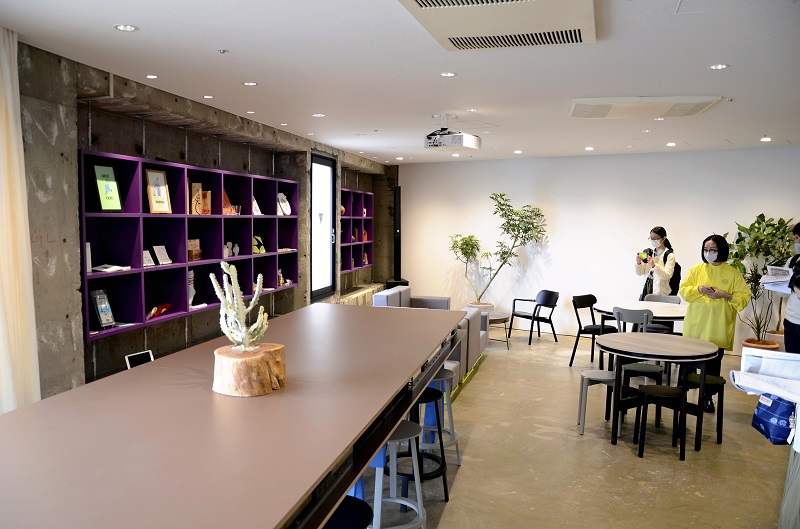
A view of the shared office workspace “SkiiMa,” which opened in April in Kichijoji Parco department store in Musashino, western Tokyo.
7:54 JST, May 12, 2021
With companies pressed to further promote working at home as the pandemic continues unabated, competition among businesses offering office-sharing services has intensified.
More and more companies have branched out into this field to make effective use of redundant workspace, even using sales floor areas, with each trying to differentiate themselves from their rivals.
In the shared office concept, those who want to work somewhere other than their company office pay to use a workspace furnished with a desk, communication equipment and other amenities.
Parco Co., which operates commercial facilities, opened its “SkiiMa” working space in April as a shared office on the eighth floor of the Kichijoji Parco department store in Musashino, western Tokyo. The space had been used for a sporting goods shop before.
As Parco has earned a reputation as the base for new fashion trends, it paid special attention to the interior furnishing and design.
“The teleworking-related market is expected to grow, but the competition has become intense,” said Takashi Sensui, a managing executive officer at Parco.
Office sharing had been growing gradually, thanks mainly to their use by IT firms, but really took off with the start of the pandemic.
According to Jones Lang LaSalle K.K., an integrated real estate service provider, the total floor area of shared office space in Japan was about 430,000 square meters as of the end of last year, a 70% increase from a year earlier.
Aoki Holdings Inc., which operates a chain of men’s apparel stores, has since February opened three shared offices in Kanagawa Prefecture by renovating a portion of its properties. As demand for men’s clothing has slumped, the company is looking to make more efficient use of its many suburban outlets. It aims to open shared offices at 100 locations over the next five years.
East Japan Railway Co. is moving ahead with establishing shared offices within its stations. Among the many others entering the market are such diverse companies as Daikin Industries Ltd. and Tokyo Electric Power Company Holdings Inc.
Meanwhile, shared office operators in central Tokyo have gone on the offensive by offering discounted usage fees. Office-sharing giant WeWork Japan introduced a new service plan last December that offers markedly reduced monthly membership fees.
“Because there are new entries continually joining the market, oversupply will advance further in the days ahead,” an industry source said. “To gain a foothold in the market even after the coronavirus is contained, the differentiating yourself from the others will surely be the key.”
Top Articles in Business
-

Prudential Life Insurance Plans to Fully Compensate for Damages Caused by Fraudulent Actions Without Waiting for Third-Party Committee Review
-

Narita Airport, Startup in Japan Demonstrate Machine to Compress Clothes for Tourists to Prevent People from Abandoning Suitcases
-

Japan, U.S. Name 3 Inaugural Investment Projects; Reached Agreement After Considerable Difficulty
-

Toyota Motor Group Firm to Sell Clean Energy Greenhouses for Strawberries
-

SoftBank Launches AI Service for Call Centers That Converts Harsh Customer Voices into Softer Voices
JN ACCESS RANKING
-

Japan PM Takaichi’s Cabinet Resigns en Masse
-

Japan Institute to Use Domestic Commercial Optical Lattice Clock to Set Japan Standard Time
-

Israeli Ambassador to Japan Speaks about Japan’s Role in the Reconstruction of Gaza
-

Man Infected with Measles Reportedly Dined at Restaurant in Tokyo Station
-

Videos Plagiarized, Reposted with False Subtitles Claiming ‘Ryukyu Belongs to China’; Anti-China False Information Also Posted in Japan





















